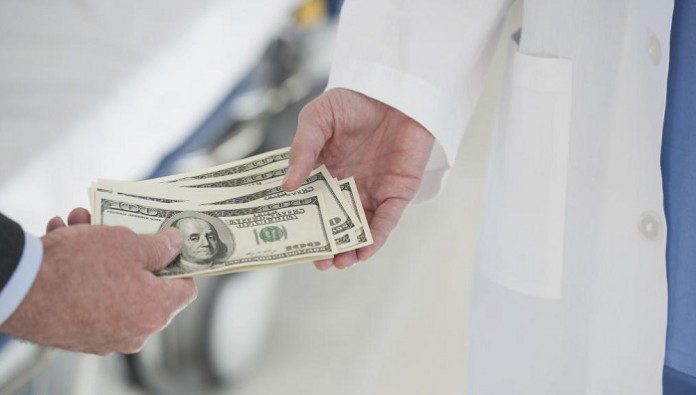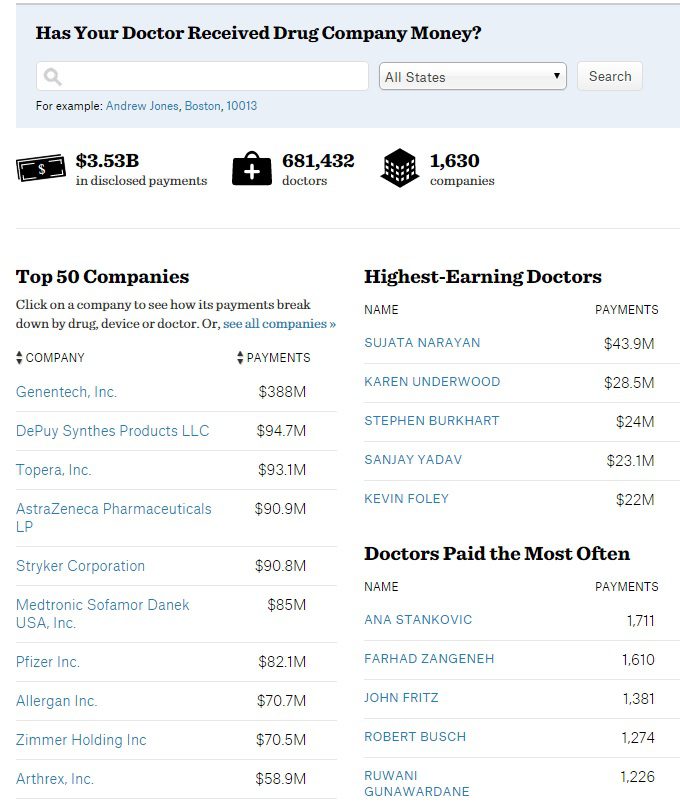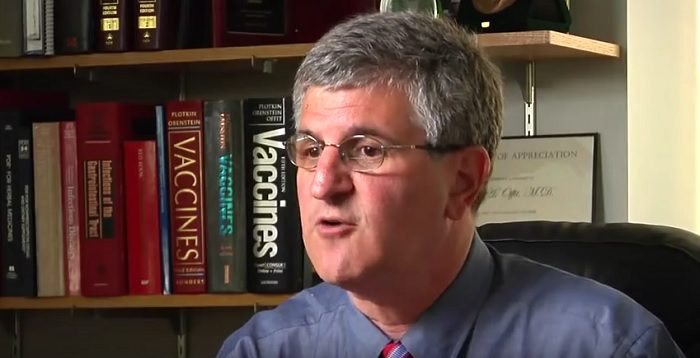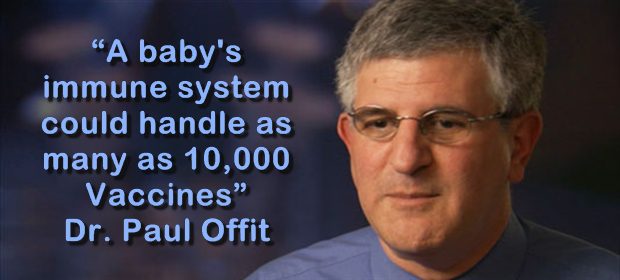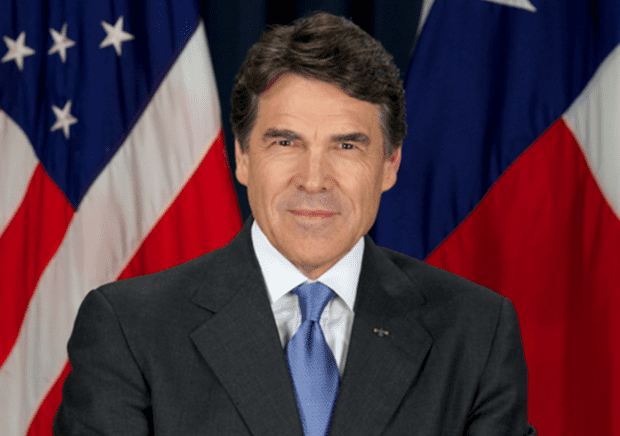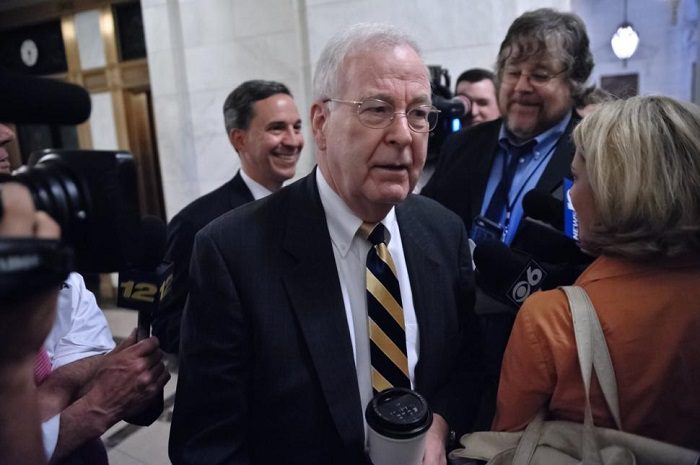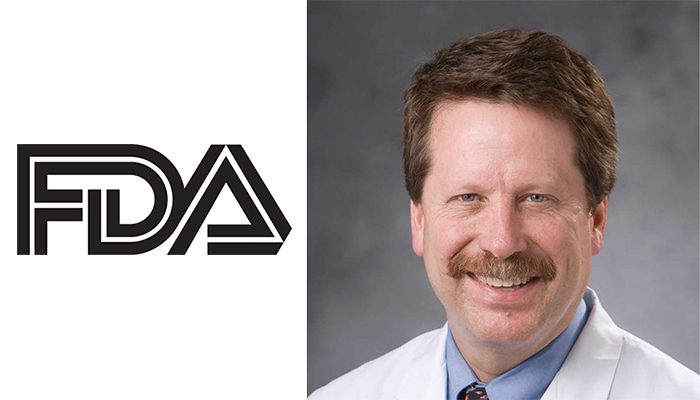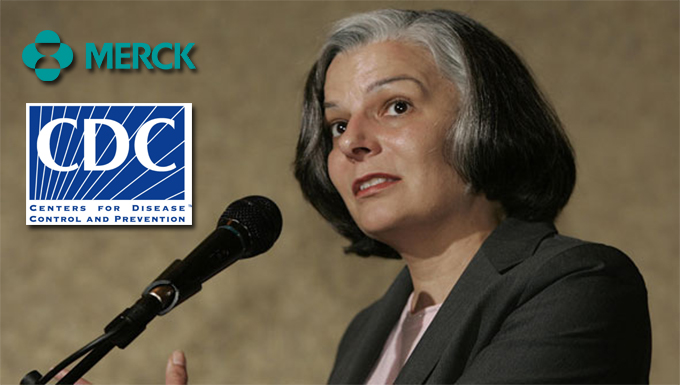A Comprehensive Look At Vaccines: Part 3 of 12
Conflict of Interest – a situation in which a person has a duty to more than one person or organization, but cannot do justice to the actual or potentially adverse interests of both parties.
Sometimes a conflict of interest requires you to decide between doing the right thing or doing the profitable thing. When we look into policy makers and regulatory agencies that promote and mandate vaccines, we see over and over that they are financially tied to vaccine manufacturers. Of course there are many parents who are vaccine proponents, who have nothing at all to do with the pharma payroll. It’s the people who convinced us all that vaccines are safe and effective who invariably stand to benefit financially: either they own drug company stock, hold a vaccine-related patent or receive compensation of some type from pharmaceutical companies.
It isn’t only doctors who reap the financial benefit of an expanded and vigorous vaccine schedule. Legislators and politicians have their hands in the pie too. No matter where we look, the drug company money trail leads to the most fierce vaccine defenders. We must conclude that, at the very least, the judgment of those sharing profit with pharmaceutical companies is compromised. So many policy makers, regulatory agencies, doctors, medical institutions and academic institutions have violated a fundamental principle of ethics, which is to avoid even the appearance of impropriety. They consistently tell us that taking money from drug companies does not constitute a conflict of interest because it does not influence their decisions, but it does and there is plenty of research to prove it.
How Much Do Pharmaceutical Companies Pay Doctors?
Beginning in 2013, under the Sunshine Act, pharmaceutical and medical device companies were legally required to release details of their payments to a variety of doctors and U.S. teaching hospitals for promotional talks, research and consulting, among other categories. Below is a partial screenshot from a website called Propublica.org
Propublica tracks payments made to doctors from pharmaceutical companies. This graphic represents the amount of money pharma companies paid doctors from August 2013 to December 2014, not counting research and ownership interests. As you can see in the chart below, doctors have received over $3.5 billion in just a 16 month period. That works out to over $200 million every month.
Billions of dollars, spent year after year, buys a lot of influence. It is enough to buy an army of loyalists. How many of these doctors are writing favorable reviews about pharmaceutical products? How many times are they influenced to write a prescription for a particular drug, based on their relationship with the manufacturer? How much advertising for the drug companies have these doctors done, under the guise of continuing education? Somehow, these blatant conflicts of interest are considered normal practice in the medical world. As Dr. Marcia Angell tells us, the pharmaceutical industry spends vast sums of money to purchase influence, and, as she puts it, “it nearly always gets what it pays for.”
Conflicts of Interest
Dr. Paul Offit
Paul A. Offit, MD, is the director of the Vaccine Education Center and an attending physician in the Division of Infectious Diseases at The Children’s Hospital of Philadelphia. He is a favorite vaccine expert of both the pharmaceutical industry and the media. He has published hundreds of papers on the topic and has written a number of books on the subject of vaccines. He has also won many awards and has been honored by Bill and Melinda Gates during the launch of their Foundation’s Living Proof Project for global health.
Vaccine Millionaire
There are a few facts about Dr. Offit that you won’t find mentioned in his bio on his employer’s website. For example:
Dr. Offit is listed as an inventor for a cluster of vaccines produced by drug manufacturer Merck and has made millions of dollars (he won’t divulge how many millions) as a result of a $182-million sale by the hospital of its worldwide royalty interest in the Merck Rotateq vaccine. Dr. Offit and Merck appear to have a great relationship, in fact. He also holds a $1.5-million research chair at Children’s Hospital, co-sponsored (funded) by Merck.
Dr. Offit is such a well-respected expert on the topic of vaccines that he sat on The Advisory Committee on Immunization Practices from 1998-2003. ACIP is a professional board selected by the Secretary of the U.S. Department of Health and Human Services that advises the Centers for Disease Control and Prevention (CDC) on vaccine-preventable diseases.
From his position of power, Dr. Offit voted three times in favor of his own Rotateq vaccine being included in the schedule of childhood vaccines. As a result of Merck’s rotavirus vaccine being added to the CDC’s childhood vaccination schedule, the value of Dr. Offit’s stake in the vaccine has increased exponentially.
In 2008, the CBS Evening News ran a story by investigative correspondent Sharyl Attkisson, entitled How Independent Are Vaccine Defenders? This was an exceedingly rare foray by traditional media into news that is not overtly friendly toward the pharmaceutical industry. Dr. Offit and his connections to drug manufacturer Merck played prominently in the story, in which he was dubbed “a vaccine industry insider”. Even so, he declined to be interviewed.
100,000 Vaccines At One Time?
This was later backed down to 10,000 vaccines at once, but there is almost no difference in the two because both figures are ridiculous. One has to wonder if Dr. Offit has ever met a vaccine he didn’t like. Ever in favor of more vaccines for more people, more often, Dr. Offit has infamously insinuated that vaccines are as safe as water. His research was cited in the following statement in the October, 2005 edition of the CHOP Parent Pack, a resource for parents published by the hospital where he works:
While no longer available on the CHOP site, the digital age has afforded us the ability to view this bulletin easily, as copies of it are still available on a great number of websites.
Let’s just stop and think about that for a minute…. Dr. Offit’s research tells us that it’s safe for babies to take 10,000 shots at once? Using Dr. Offit’s revised figure of 10,000 vaccinations at once, we have to wonder what would make a person of Dr. Offit’s stature say something like this, being that there are many documented cases of children dying after just 6-13 doses at once? Keep in mind that this is one of the medical establishment’s and media’s foremost authorities on vaccines.
This would almost be funny if it weren’t so serious. As laypeople, as parents, do we need research to tell us that 10,000 vaccines contain chemicals far exceeding any acceptable EPA maximum exposure limits? To this day, we still haven’t performed any short or long term safety tests on the combination of 3-9 vaccines, (normal visit with current childhood schedule), let alone 10,000. Vaccines are only tested one at a time. What research is Dr. Offit using to support such a ridiculous and irresponsible claim? What is his motivation? How are we to trust Dr. Offit’s recommendations when he doles out safety advice like this, devoid of any research to support his claims?
Parental Rights Aren’t Really a Thing?
In an article titled Elimination of vaccine exemptions serves children’s best interests, published on Healio.com, (for which Offit is an editorial board member), he is quoted as saying that parents “don’t own their children”. In one bizarre sentence, Offit equates ownership with fundamental parental rights. His reasoning is more than slightly askew, as he attempts to equate choosing not to vaccinate with child abuse and neglect. Here is the exact quote:
In other words, parents don’t own their children,” Offit said. “When you have a child, you have a certain responsibility to keep them safe and well, and if you don’t meet that responsibility, then there are times that the state can step in.”
Of course. The state steps in when you abuse or neglect your child. Otherwise, how you parent is your choice and is based on your family’s individual values, beliefs and perspectives. This statement just goes to show the level of arrogance we’re dealing with in Dr. Offit. If people could own other people and children were property, would the state then own them? And exactly how is it that Dr. Paul Offit’s opinion should prevail for all children, over that of their parents? How clever to frame inalienable, fundamental parental rights as an ownership issue. How strange, too, that Dr. Offitt would be so brazen. Parents make decisions based on the best interests of their children, while Dr. Offit’s habit is to officially recommend things that make him lots and lots of money. Are we to believe that this vaccine developer cares more about children than their parents, or that he knows what’s best for our children even though there is no conclusive empirical data saying that forgoing vaccines puts children at risk? (see more in part 6 about this)
Leader of a New Morality?
Not only does Offit purport to be an authority on the constitution, but also on morality and what religion does and does not support. Healio.com quotes Offit: ‘“Religious exemptions don’t make sense from the standpoint of either biblical scripture, constitutional law or religious morality,” Offit said.’ It sounds like Dr. Offit fancies himself something of a enlightened leader, in need of a flock. It would seem that Offit would have his particular kind of science be everyone’s new religion. Even the New York Times had some harsh criticism on Dr. Offit’s religious viewpoints in regard to vaccines.
What Are The Real Risks?
Implicit in Offit’s argument is that vaccines are safe and effective, but a closer look reveals that there is absolutely no conclusive evidence that foregoing vaccinations is more dangerous than having them. In fact, there is a growing body of evidence that is proving the exact opposite. What about the children who are injured from vaccines every day? Is it a less heinous thing to subject your child to a vaccine that injures him because it’s sanctioned by millionaire vaccine patent holder Paul Offit?
Dr. Offit tells us that vaccines stand on a mountain of evidence and that to refute them is equivalent to refuting gravity. Just because you say something with authority and an air of certainty, does not make it true. As we illustrated in part one of this article, Offit’s ‘mountain of evidence’ is actually a carefully constructed pile, containing a lot of flawed research, funded by pharmaceutical companies and fraught with manipulation and corruption. The mountain crumbles when exposed to the truth. We cannot use existing data to make reliable decisions. The evidence to which he refers is woefully agenda-driven and one-sided.
If the pharmaceutical industry were looking for the perfect front-man to support their products and improve their revenue, it would be tough to find a better partner than Dr. Paul Offit. Given his financial arrangements with drug makers, it would also be tough to find someone less objective.
Dr. Richard Pan
Richard Pan is a medical doctor (pediatrician), a legislator and a pharmaceutical industry insider. He is a freshman state senator in California and is co-author and sponsor of SB277, which was passed into law in 2015. Beginning in 2016, the law removes the personal belief philosophical/religious exemptions for vaccinations in California, thereby mandating childhood vaccines, regardless of parental beliefs or concerns.
The Most Dangerous Substance in Vaccines is Water?
In the short video above, Dr. Pan gives a presentation on vaccinations which is quite remarkable. Dr. Pan makes a bizarre attempt to argue that the most dangerous ingredient in vaccines is water. He goes on to say “more people die of water toxicity than anything else in the vaccine.” At that point the moderator is confused and asks Dr. Pan to clarify his statement. Dr. Pan then says more people die from drowning than from vaccines, and then he says “but, yet, we’re not worried about water because we know the dose matters, right?” “They’re not going to drown from an injection.” What?? I have to admit, Dr. Pan’s logic escapes me.
Whoever He Answers to, it Isn’t the Voter
Then an audience member asks Dr. Pan “is it possible water is causing autism?”, to which Dr. Pan replies: “one of the things we need to do as public health, you know. Uh, in the public health field, is that, is actually educate people about… relative risks, right?” “I mean that is something we have not done a good job at.” Less than a minute after Dr. Pan makes that statement, one of his co-presenters goes on to explain the importance of herd immunity and then one of his constituents asks him a very good question about herd immunity: “85% of the adults in this country are not vaccinated and you’re talking about community immunity just among the children, I mean it doesn’t make any sense.” Moderator: “We are now out of time.” Constituent: “What do you have planned for adults?” Dr. Pan just talks over his constituent and never answers the question. The truth is, Dr. Pan doesn’t have to answer to citizens. As you can see, he didn’t even need to prepare an intelligent or cohesive talk to support the bill that takes away parent choice. He knows that his position is backed by the most powerful lobby in the world.
In the video, you hear Dr. Pan state that they need to do a better job of educating people and then one minute later, he ends the meeting and cuts off his constituent when presented with an opportunity to do just that. Toward the end of the video, another constituent asks a question about a vaccinated versus unvaccinated study but Pan does not answer him either. He is then whisked away by what appears to be two burly security men.
Not Concerned with the Truth
Check out Dr. Pan’s statement (0:47) that Thimerosal is not in childhood vaccines. This is blatantly untrue. Several versions of the flu vaccine contain Thimerosal, about half of which is mercury. The CDC says children should receive the flu vaccine every year, even though they and the American Academy of Pediatrics called for the removal of Thimerosal from vaccines in 1999.
While in private practice, Dr. Pan supported vaccine exemptions. Once in office, his position changed significantly. He is co-author and sponsor of the law that ends personal and religious vaccine exemptions in California. Lets take a closer look at Dr. Pan’s financial ties to pharmaceutical companies.
The Sacramento Bee ran an article titled, “Drug Companies Donated Millions to California Lawmakers Before the Vaccine Debate” about drug company influence on California lawmakers as it relates to SB277. Their research revealed the following:
“Pharmaceutical companies and their trade groups gave more than $2 million to current members of the Legislature in 2013-2014, records show. Nine of the top 20 recipients are either legislative leaders or serve on either the Assembly or Senate health committees. Receiving more than $95,000, the top recipient of industry campaign cash is Sen. Richard Pan, a Sacramento Democrat and doctor who is carrying the vaccine bill.”
Following his sponsorship of SB277 and his work on behalf of pharmaceutical companies to eliminate vaccine exemptions, California voters worked to initiate a recall to unseat Richard Pan as state senator. The following statement is posted on the Change.org website: “We call on California State Senator, Dr. Richard Pan to resign from his position due to his vested interests in profiting from Merck, GlaxoSmithKline and literally dozens of pharmaceutical companies, and the conflict of interest this causes.”
Rick Perry, Former Governor and Presidential Candidate
In 2007 Texas Governor Rick Perry decided to use an executive order to make the HPV vaccine mandatory for 12 year old girls across the state. An article that appeared in the American Free Press in May, 2015 described Perry’s HPV vaccine mandate:
“Few people had heard of human papillomavirus (HPV) vaccines prior to Texas Governor James Richard “Rick” Perry’s failed bid for the 2012 Republican presidential nomination. What America learned is that Perry bypassed the legislature and on February 2, 2007 issued an executive order making Texas the first state in the country to force sixth-grade girls to receive the three-shot vaccination series, which cost about $120 per shot, known as Gardasil.”
In 2011, Rep. Michele Bachmann (Minn.) suggested that Rick Perry made the HPV vaccine mandatory in Texas in 2007 because he was beholden to the pharmaceutical manufacturer Merck, which provided funding for his campaigns and which employed his former Chief of Staff, Mike Toomey as a lobbyist. CNN explained it this way: “Perry’s friend, former chief of staff Mike Toomey, spun through the revolving door to become a lobbyist for Merck in Texas, a position he held at the time of the HPV-related executive order.” In 2011, Toomey co-founded a super PAC known as Make Us Great Again to aid Perry’s presidential run.
A WSJ article from September, 2011 notes that Perry didn’t tell the whole truth when he said that Merck made a $5,000 campaign donation. In fact, “Merck has actually given Mr. Perry $29,500 through its political action committee since Nov. 2, 2000.” Merck contributed heavily to the Republican Governors Association, since 2006. That’s when Rick Perry became active in the organization. He served as the chairman of the national campaign committee for two different terms and was the finance chairman for RGA for a term, as well. “The RGA was also one of Mr. Perry’s biggest donors during the past five years. Since 2006, it has given his gubernatorial campaigns $4 million, according to state records…”
“Perry’s actions benefiting donors from the pharmaceutical industry don’t appear to stop with Merck. For instance, drug-maker Novartis Pharmaceuticals has also contributed handsomely to the Republican Governors Association and it has also benefited from Perry’s support. Novartis has donated $700,000 to the RGA since January 2006, although it has only directly donated $5,000 to Perry’s own campaign. In 2009, Perry signed a bill into law mandating meningitis vaccines for all college students, a requirement he expanded again earlier this year. Novartis was not the only pharmaceutical company to benefit from the new requirement, but its Manveo vaccine, introduced less than a year later, fit the bill.” (CNN)
Pharmaceutical companies have a vested interest in the outcome of elections. Mike Ludwig wrote an article for truth-out.org in September, 2015 entitled “How Much of Big Pharma’s Massive Profits are Used to Influence Politicians?”, which reveals that “Pharmaceutical and health product companies injected $51 million into the 2012 federal elections and nearly $32 million into the 2014 elections, according to the Center for Responsive Politics (CRP). The industry has already spent nearly $10 million on the 2016 elections and is expected to spend more…”
Kemp Hannon
New York State Senator Kemp Hannon heads the Senate Health Committee and is the author of the new law that mandates the meningitis vaccine for all 7th and 12th graders in the state. In November, 2015, The Daily News revealed that Hannon “….has up to $130,000 in investments in pharmaceutical and other health-related companies….”. The same article notes that last year, Hannon invested in 14 companies that would fall under the purview of the Senate Health Committee. Senator Hannon owns stock in the same companies that make the vaccines he’s mandating. They stand to make huge profits due to the passage of the law Hannon wrote, and so does he. It was also reported that Kemp has received more than $420,000 from pharmaceutical companies and other medical interests in the last 4 years. This is the very definition of conflict of interest.
Dr. Robert M. Califf
President Obama has nominated Dr. Robert M. Califf to be the next FDA commissioner. This AP story notes that Dr. Califf was characterized by Harvard University professor of government Daniel Carpenter, as “…. the ultimate insider for the job, having been groomed for this position since the George W. Bush administration” While Dr. Califf has an uncharacteristic lack of public health experience compared to those who have historically held the position, he does happen to have some very close relationships with various drug manufacturers. “A disclosure form filed with Duke University last year shows Califf received research grants or consulting fees from a dozen drugmakers, including Merck & Co., Roche and Eli Lilly & Co.”
Even traditional media sources, including The New York Times and TIME Magazine, have run articles on Califf’s ties to the pharmaceutical industry. The NY Times article acknowledges that Califf “…. has deeper ties to the pharmaceutical industry than any F.D.A. commissioner in recent memory, and some public health advocates question whether his background could tilt him in the direction of an industry he would be in charge of supervising.” Prior to accepting his current position as a deputy commissioner at the FDA in February, 2015, Dr. Califf spent decades as a researcher at Duke University. His salary there was “contractually underwritten in part by several large pharmaceutical companies, including Merck, Bristol-Myers Squibb, Eli Lilly and Novartis. He received up to $100,000 a year in consulting fees from drug companies, according to his 2014 conflict of interest disclosure.”
From a February, 2015 Time article regarding Califf’s ties to drug companies: “Diana Zuckerman, President of the National Center for Health Research, which advocates for FDA regulatory authority, says such ties “should be of great concern.” Dr. Califf is “a very accomplished, smart physician who’s been an important name in the field,” Zuckerman says, but his “interdependent relationships” raise questions about his “objectivity and distance.” She cites several studies suggesting the medical products industry uses such ties to influence the behavior and decision making of doctors and researchers, even when the scientists don’t realize it.”
Dr. Michael Carome, Director of Public Citizen’s Health Research Group notes the same concern in the organization’s September 2015 press release. Urging the Senate to reject Califf’s nomination, the release warns: “Califf’s appointment as FDA commissioner would accelerate a decades-long trend in which agency leadership too often makes decisions that are aligned more with the interests of industry, rather than those of public health and patients.”
Dr. Califf has alluded to a distaste regarding the degree to which regulation increases drug manufacturer costs and extends timelines for new drugs to hit the market. If confirmed as commissioner, time will reveal the extent of his convictions.
Dr. Julie Gerberding
Dr. Julie Gerberding was the head of the CDC from 2002 to 2009. During her tenure at the CDC, there were many scandals within the department that are still reverberating today. There have been allegations of destroying data linking Merck’s MMR vaccine to autism as well as other ethical breaches that are still being discovered long after she left. After Dr. Gerberding left the CDC, she was hired by Merck to head up their vaccine division where she enjoys a considerable pay raise and has held almost $5 million dollars of Merck company stock. Was this a quid pro quo for all the covering up the CDC did under her reign? We go more into detail about Dr. Gerberding in the next part of this series.
Is This Group Legitimate?
NACCHO is the acronym for the National Association of County & City Health departments (LHDs), which includes more than 13,000 public health professionals, who together provide services to almost three-quarters of the U.S. population. NACCHO identifies their mission: to be a leader, partner, catalyst, and voice for local health departments. While it sounds like a typical quasi-governmental public health organization, many claim that it’s nothing more than a propaganda machine, funded by the pharmaceutical industry. NACCHO, they say, is just another very clever vehicle for embedding bought vaccine proponents into the very fabric of society, providing them an esteemed forum and credibility as benevolent and concerned leaders.
NACCHO collects membership dues from local health department members, but that accounts for only $595,000, which is less than 2% of its 2014 budget of $23 million. “NACCHO is generating the majority of their annual revenue from two sources: government grants ($19.3 million) and other grants ($3.6 million).” You can view partners/funders of NACCHO here. Their 2016 Fiscal Priorities for Public Health document, available here, will give you a good idea of how NACCHO priorities line up with those of our public health organizations and if you read between the lines, you can see that these have a lot to do with the proliferation of vaccines.
Now that vaccine exemptions have been eliminated in California, a movement is afoot to do so in other states. Despite the fact that organizations who receive federal funds are prohibited from lobbying, it appears that NACCHO has been lobbying state legislators heavily in Oregon, as one example. NACCHO has set forth a vaccine agenda in favor of more vaccines, vaccines for people of all ages (cradle to grave) and a national vaccine registry.
Dr. LaMar Hasbrouck is the Executive Director of NACCHO and also appears to be a friend of Dr. Gerberding. Both individuals went to UC Berkeley and both were employed by CDC during exactly the same time period. At least one author suggests a connection, with Gerberding perhaps exerting some influence in the creation of NACCHO and who was hired to lead it. It isn’t hard to see how the pharmaceutical industry has created a deliberate and intricate network, forming alliances with those in the most critical positions, and thus, has taken control of the national vaccine agenda.
Summary
No matter where we look, the policy makers pushing an aggressive vaccination agenda have some sort of financial ties to the pharmaceutical industry or directly benefit from the promotion of vaccines. Are they really concerned with the health of our nation, or are their motives financially driven?
Failing to disclose conflicts of interest in most occupations is highly suspect behavior and allowing such conflicts to influence professional decisions is malpractice. Sometimes it’s criminal. In the world of medicine and public policy, though, conflicts of interest are par for the course. As much as we would like to imagine that policy makers have our best interests at heart, we will never know as long as these financial motivations exist.
What is most troubling is the only catalyst for mandating vaccines and the removal of exemptions seems to be based on economics, and not health concerns like we are told. What significant infectious disease event has occurred to spark such an aggressive policy? And please, don’t tell me that a hundred cases in Disneyland is the reason. That is not an epidemic and it does not even come close to justifying such an over-reaction.
This is Part 3 in the 12 part series: A Comprehensive Review of Vaccines
Part 1: Why Are So many People Choosing Not To Vaccinate?
Part 2: A Closer Look at Pharmaceutical Companies
Part 3: Vaccine Policymakers and Conflicts of Interest
Part 4: How The CDC, FDA and WHO Lost the Trust of Vaccine Skeptics
Part 5: Are Vaccines Safe & Effective?
Part 6: What Are The Real Risks of Not Vaccinating in the U.S.?
Part 7: Herd Immunity, Shedding and the Questionable Science Behind Vaccines
Part 8: Did Vaccines Really Eradicate Infectious Diseases in the 20th Century?
Part 9: The Conclusive Evidence Linking Vaccines and Autism
Part 10: Why Don’t We Hear The Whole Story About Vaccines?
Part 11: What Are Independent Experts Telling Us About Vaccines?
Part 12: Vaccines: The Greater Good or Greater Greed? – Conclusion
Speed the Shift is an independent group of researchers on a mission to find the truth about controversial topics. We utilize alternative information sources that are often ignored or outright censored by the corporate media in an effort to gain a broader awareness of relevant issues.







